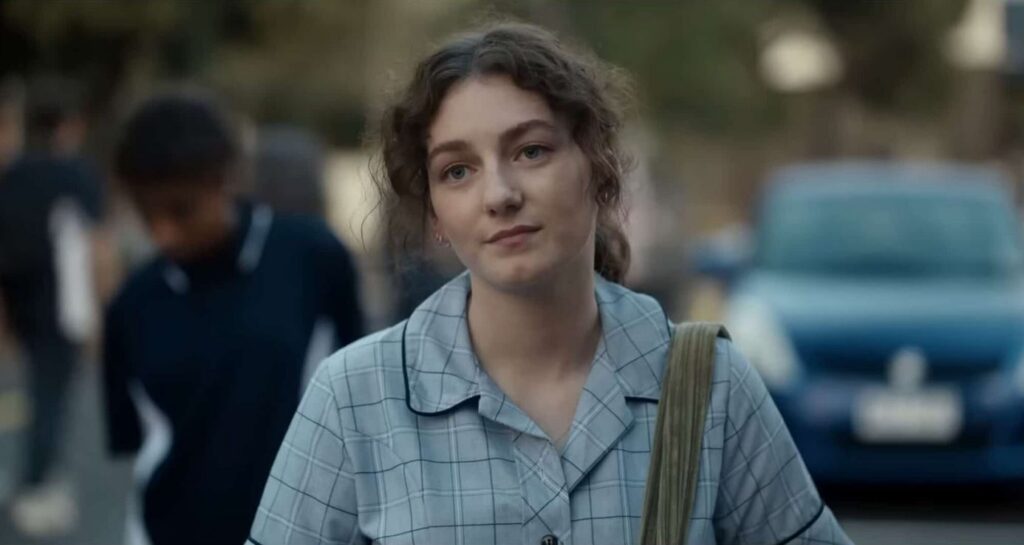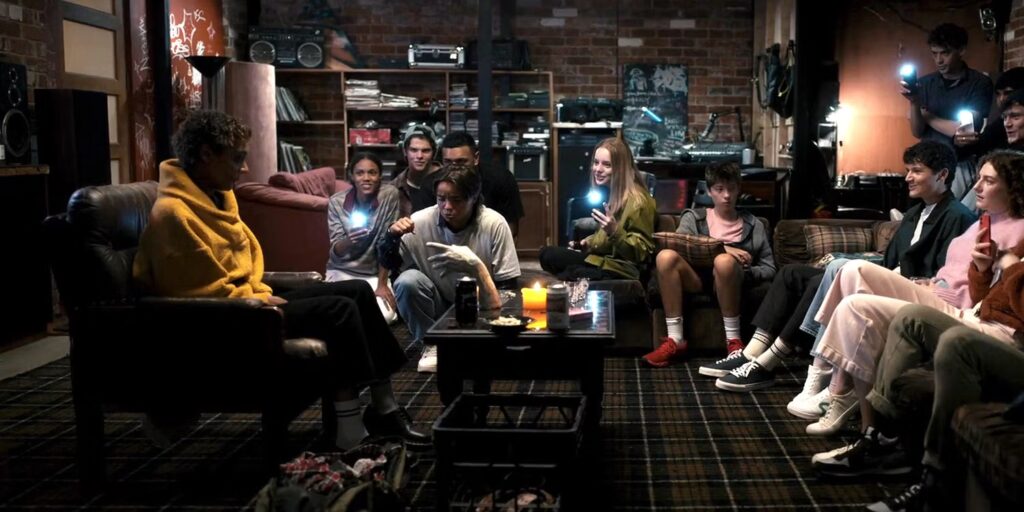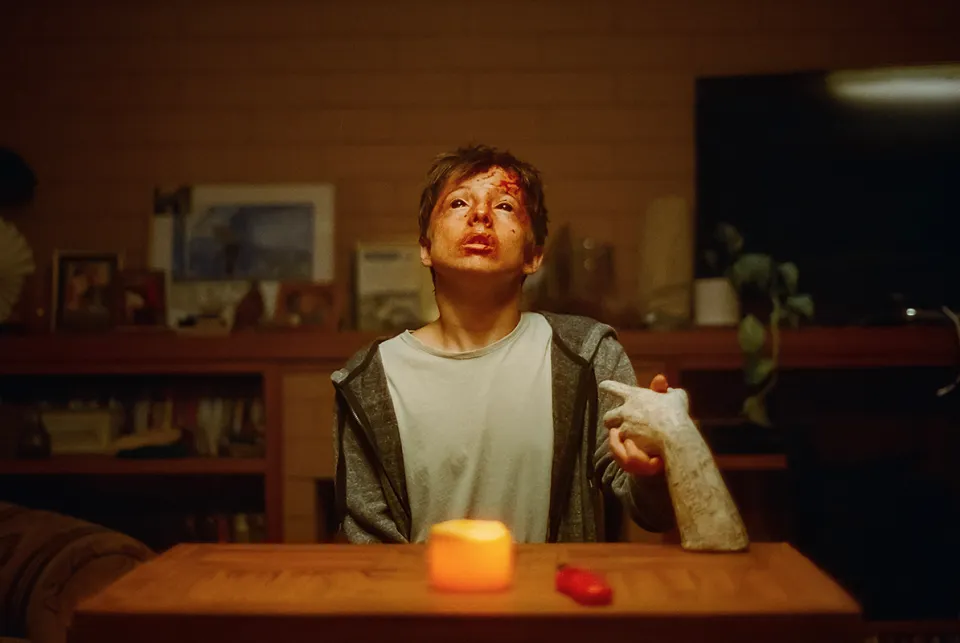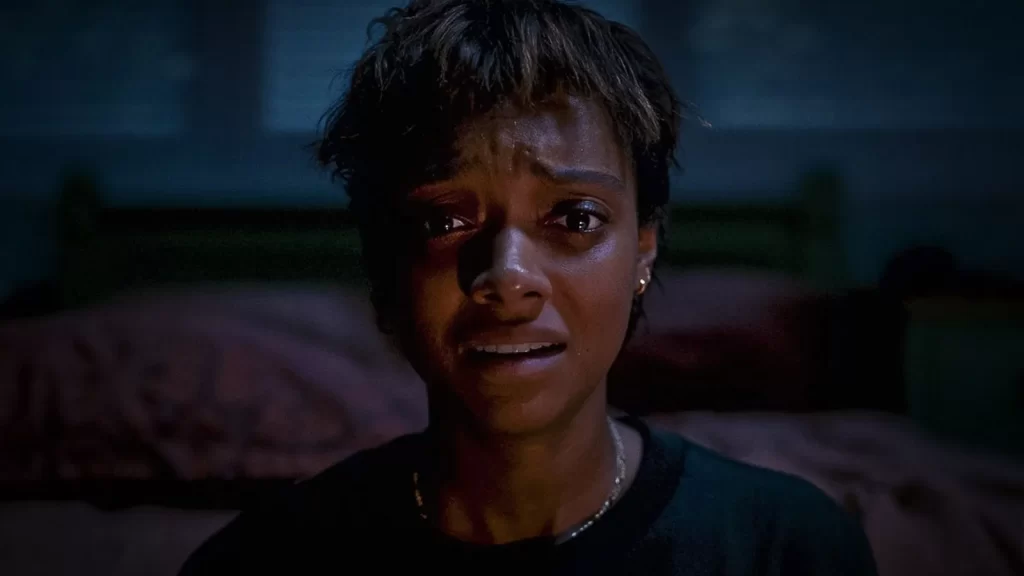
Cruising down a darkened roadway while belting out the lyrics to a Sia song, the teenaged Mia (Sophie Wilde) suddenly slams on the brakes to avoid running over a wounded kangaroo, which is lying helpless in the middle of the street. Her young companion, an eager 13-year-old boy named Riley (Joe Bird), urges her to put the poor animal out of its misery. Mia initially resolves to oblige, but—whether due to a surfeit of compassion or a lack of determination—she ultimately chooses to leave the pitiful creature be. This scene, which is never explicitly referenced again, has absolutely no figurative bearing on anything that comes after.
I’m kidding, of course. But one of the intriguing things about Talk to Me, the creepy and jagged new horror picture from Danny and Michael Philippou, is how it operates as a metaphorical Rorschach test. Is it a critique of the restlessness of the TikTok generation? A commentary on the fraying bonds of the modern nuclear family? A sobering portrait of the perils of drug addiction? Or is it just a really scary movie in which a few hapless kids make the mistake of messing with some very angry demons?

Most obviously, Talk to Me belongs to the booming subgenre of horror that detractors might dub Trauma Porn, in which a character’s grief grows so all-encompassing, it inspires a series of spiraling supernatural miseries. (Last year’s entries in this subtextual field du jour included Men, Smile, and Resurrection.) Mia may be reasonably well-adjusted, but she remains haunted by her mother’s two-year-old suicide, which in its wake crippled her relationship with her emotionally impotent father (Marcus Johnson). She instead spends most of her time with Riley and his older sister, Jade (Alexandra Jensen), the latter of whom has just started dating Mia’s sorta-ex-boyfriend, Daniel (Otis Dhanji). Jade and Riley’s mother, Sue (Miranda Otto, bringing some name recognition to a cast otherwise composed of capable unknowns), treats Mia like she’s part of the family, which means she’s regarded with both affection and suspicion.
The Philippous sketch out this crisscrossing web of blurry relationships with solid efficiency, as they’re in an understandable hurry to get to the good stuff. Two of Mia’s classmates—“friends” is too strong a word, given her social reputation as a downer—have procured a magical ceramic hand which, upon being clasped and receiving verbal permission (hence the imperative title), temporarily channels the spirits of the dead into the bodies of the living. The technical aspects of this process are both sensibly hazy and weirdly complex; you need to first light and subsequently extinguish a candle, and there’s a 90-second deadline after which things become “unsafe,” but don’t worry, I’m sure that won’t come up later.

Something else I’m sure of: Surrendering control of my body to an unknown, potentially nefarious being is not my idea of a fun Saturday night. But perhaps I’m failing to appreciate how classic societal forces—peer pressure, small-town boredom—operate in the social-media age. It seems significant that whenever Mia or one of her pals participates in the ritual, others in the room instinctively whip out their phones and start live-streaming, hoping to capture the latest instance of “accept the challenge” virality.
They get more than they bargained for. As an allegory of anguish, Talk to Me is unsatisfying, but as a set piece machine, it sizzles. The movie’s opening sequence—which is seemingly disconnected from its main plot, at least until one of those obligatory “prior victim imparts mythological wisdom” scenes—is a total corker, infusing a house party with swelling tension that inevitably explodes in a moment of ghastly, electric violence. And the possessions themselves, in which the participants’ pupils become eerily dilated (a reliably chilling effect), seethe with excitement and unpredictability, which the Philippous exploit with impressive variety. One montage, in which different teens take a turn talking to the hand, plays as wryly comic—a “Who’s got next?” cavalcade of the intermittently bewitched. Yet when young Riley finds himself embodied by a lost soul that purports to know Mia, the tone changes on a dime from amity to agony, resulting in a terrifying scene that renders the term “headbanger” appallingly literal.

That sequence, which features gnarly practical effects and ghoulish makeup, signals Talk to Me’s pivot into a moodier, more familiar sort of picture. As she finds herself plagued by dreams and visions—an inexplicable figure lurking in a corner, a spectral presence interrupting her sleep—Mia worries that remnants of the spirit realm have crossed over into her own world. Can she use her guile and resolve to combat the phantasms that torment her, or is she destined to succumb to the same madness that supposedly claimed her mother?
The answer is less absorbing than you might hope. Movies like Talk to Me need to thread a fine needle; they can’t be weighed down by exposition or rely too heavily on definitive rules (because logic can puncture terror), but they also can’t be overly haphazard in assaulting viewers with nightmarish esoterica (because excessive randomness dilutes the thrill). The preeminent example in this regard remains It Follows, which deployed a streamlined mythology to amplify its provocative themes without sacrificing an ounce of its spine-tingling dread. It’s a difficult trick to pull off; even Hereditary, for all its masterfully orchestrated mayhem, lapsed into last-act absurdity.

And Talk to Me never locates the proper balance. Despite some memorable imagery—the repeated shot of decaying fingernails makes for a disturbing visual motif, while a scene where the possession’s polarity gets inverted delivers a jarring shock—it struggles to tether its mounting terror to its characters or its ideas. We sympathize with Mia, thanks to her suffering (and Wilde’s persuasive performance), but we never truly share in the pain of her predicament. What’s left is yet another horror movie that attempts to translate the concept of emotional trauma into paranormal chicanery; that’s fine, but it’s starting to feel de rigueur.
Talk to Me nevertheless constitutes a noteworthy calling card for the Philippous, a pair of YouTubers making their first feature. (Danny Philippou co-wrote the screenplay with Bill Hinzman.) They demonstrate a strong grasp of horror mechanics, staging their big sequences with showstopping élan rather than relying on cheesy jump-scares. Paradoxically, it’s the bracing quality of their technique that renders their debut something of a disappointment; despite a killer final shot, Talk to Me fails to maintain its sickly intensity over the course of its wan, sloppy third act. It’s a strange, deflating irony: The characters repeatedly utter the phrase “I let you in,” yet this promising, frustrating movie ends up keeping you at a distance.
Grade: B-
Jeremy Beck is the editor-in-chief of MovieManifesto. He watches more movies and television than he probably should.
